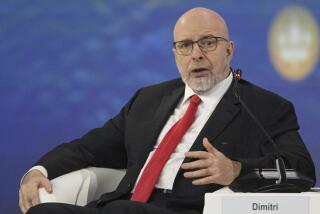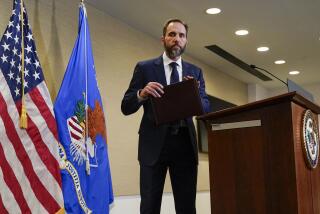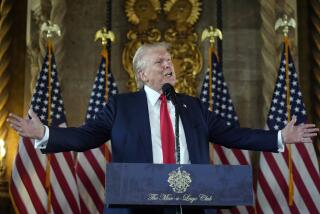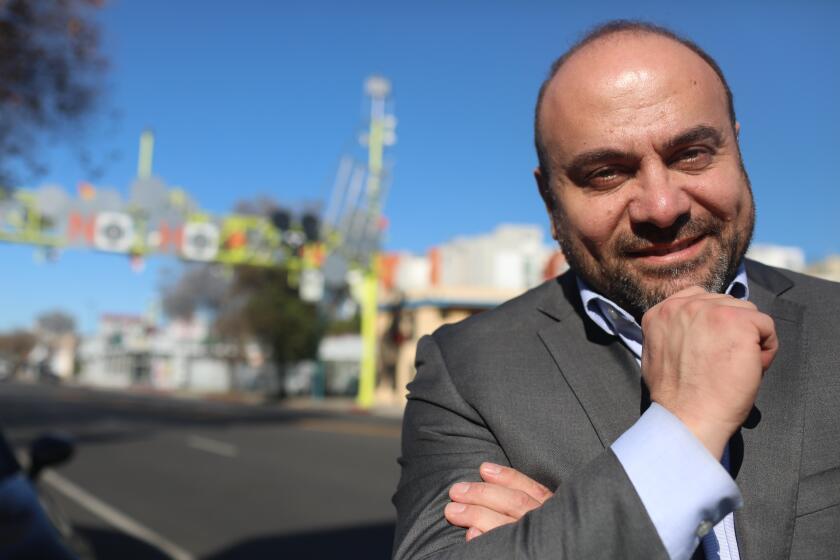Editorial: Despite what you may have read on Trump’s Twitter feed, Manafort’s indictment is a big deal

Paul Manafort and Rick Gates face numerous charges including conspiracy against the U.S. and money laundering. (Oct. 30, 2017)
Nearly six months after he was appointed special counsel, former FBI Director Robert S. Mueller III’s investigation of possible ties between the Trump campaign and Russia — as well as other matters that “may arise” — produced criminal charges on Monday. Despite what you may have read on President Trump’s Twitter feed, this is a big deal.
Former Trump campaign chairman Paul Manafort was indicted on charges of money-laundering and conspiracy in connection with his role in an alleged scheme to use offshore accounts to hide tens of millions of dollars he received for representing a pro-Russia political faction in Ukraine. Richard W. Gates III, Manafort’s deputy campaign chairman and longtime associate, was also named in the indictment.
Like any defendants, the two are presumed innocent until proven guilty. But the charges are serious, carrying years of potential prison time — and they raise questions about Trump’s decision to place these particular men at the helm of his campaign. What’s more, as everyone knows who has watched a complicated criminal investigation like this one unfold, early indictments are often brought against lower-level individuals who are peripheral to the investigation as prosecutors work their way toward the more central figures — a process that is made easier if and when the lower-level people begin to cooperate in order to protect themselves.
A wiser, more experienced and less defensive president would remain silent at this point in the investigation.
Separately, it was announced Monday that George Papadopoulos, a foreign policy advisor to the Trump campaign, had pleaded guilty to lying to the FBI about his contacts with a professor he believed had “substantial connections” to Kremlin officials. The professor told Papadopoulos that the Russians had “dirt” about Hillary Clinton and “thousands” of emails. Papadopoulos was arrested in July and has been cooperating with authorities.
Predictably, Trump and his administration were quick to discount the importance of all these charges. The president tweeted: “Sorry, but this is years ago, before Paul Manafort was part of the Trump campaign. But why aren’t Crooked Hillary & the Dems the focus?????”
In a subsequent tweet, he added: “Also, there is NO COLLUSION!” Yet one definition of collusion is soliciting “dirt” about a political opponent from a foreign government that is actively seeking to interfere in U.S. elections, then incorporating it into one’s campaign. Such dirt was what was promised in the now-famous meeting at Trump Tower in June 2016 attended by Manafort, Donald Trump Jr. and a Russian lawyer. (The ultimate act of collusion, of course, would be complicity by the Trump campaign in Russia’s hacking of Democratic email accounts and the dissemination of their contents by WikiLeaks. So far there is no proof of that sort of collusion.)
White House press secretary Sarah Huckabee Sanders on Monday tried to minimize Papadopoulos’ role in the Trump campaign, saying he served in an “extremely limited ... volunteer position.” Yet, according to court documents, Papadopoulos corresponded with campaign officials about the possibility of a meeting between Trump and Russian President Vladimir Putin. He even broached the idea at a campaign meeting Trump attended.
Also, Papadopoulos’ guilty plea should be worrisome to Trump and his lieutenants because it stems from his decision to mislead the FBI — and as most Washington-watchers know, it is often the cover-up rather than the underlying crime that leads to trouble for politicians under investigation. Mueller’s inquiry encompasses the question of whether members of the Trump administration, including Trump himself, sought to shut down the investigations — and whether they engaged in obstruction of justice along the way. Just as Mueller is looking into Papadopoulos today, he will undoubtedly be looking at Trump’s decision to fire FBI Director James Comey tomorrow.
Sanders and Trump yesterday tried to deflect attention by arguing that the real collusion with Russia was on the part of the Clinton campaign. By paying for a “dossier” about Trump, Sanders suggested, the Clinton campaign conspired with Russian intelligence to smear Trump — a far-fetched idea.
A wiser, more experienced and less defensive president would remain silent at this point in the investigation, or confine himself to expressing confidence that the system of justice would prevail. That’s probably too much to expect from Trump. What matters is that he doesn’t attempt to interfere with or short-circuit the judicial process or Mueller’s further investigations. Sanders said Monday that the president had no intention of firing Mueller, and she indicated that he would let the “process play through” before considering pardons for Manafort or Gates. Pardons — for anyone — and firing the special counsel must be off the table.
Follow the Opinion section on Twitter @latimesopinionand Facebook
More to Read
A cure for the common opinion
Get thought-provoking perspectives with our weekly newsletter.
You may occasionally receive promotional content from the Los Angeles Times.










